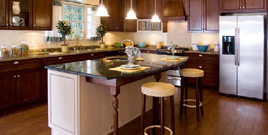As winter approaches and in light of the storms we have seen devastate neighborhoods on the Eastern seaboard this year, people want to safe homes. If you are considering building a new home, consider modular construction. Modular homes are built in a factory setting with extensive QA standards. Modules are built to exacting specifications, and...
Read MoreModular Homes VA Blog
When you're building a house from the ground up, you have a lot of important choices to make. But it is challenging to make some of those key decisions that will affect life in your new home for the rest of your homes life, or at least for the rest of the time that you...
Read MoreThe housing industry is looking for more workers and more materials along with an easier way to build homes if they want to continue to meet their production goals. The answer may be in modular construction. A year ago the Advanced Framing Construction Guideline was published, aimed at helping builders construct energy-efficient homes with...
Read MoreReturning veterans deserve a home they want and love. Modular construction is a faster, easier way for veterans and their families to live in a home that will meet all their needs and with all the design enhancements they want. Tidewater Custom Modular Homes would like to help and we would like to show our...
Read MoreIf you are in the market to build a new home in Virginia Beach, VA then consider modular homes. There are many benefits and advantages of modular construction over stick built homes. Stick built homes are those built on-site through traditional construction methods. No residential traditional builder can invest the time and money into their...
Read MoreIn our regular posts we have been talking about how modular home construction can save you money, time and stress. We thought we would share this story with you about a homeowner who wanted to build a new home and made the choice between modular and traditional construction. Here is an example of how...
Read MoreAs modular homes get assembled, people stop to watch. It’s not every day you see factory-built pieces of a home, that could be up to 60 feet long, trucked, lifted and stacked to create a modular home over a course of two days. After the modules are stacked to create the house, workers workers will...
Read MoreMany homeowners are not interested in selling their homes even though home prices are increasing. Why? Because they can’t find a better home to move into. The solution is a modular addition to your home. If you love your existing home but need some more space, another bedroom, more bathrooms or an office, modular additions...
Read MoreInterest rates are rising, but let’s face it, they are still very low. So, if you want to take advantage of interest rates before they rise more, build a custom designed modular home for your family Building a new home is a great solution for a new home. With home inventories lower than normal, building...
Read MoreModular homes are energy-efficient custom designed homes. These homes are built from the inside out, which makes them more energy efficient than stick built homes. In fact, the air-sealing and insulation is done before the home even leaves the factory. Normally, site built home with an attached garage can take anywhere from 8 months to...
Read More




